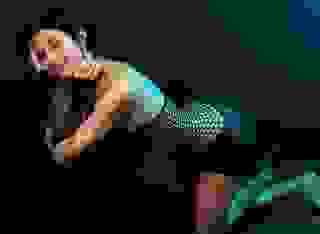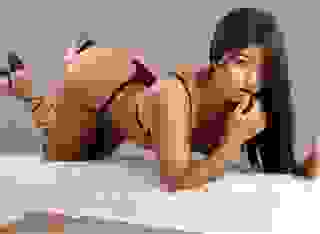- Romance
- Vive La Corse
Note: You can change font size, font face, and turn on dark mode by clicking the "A" icon tab in the Story Info Box.
You can temporarily switch back to a Classic Literotica® experience during our ongoing public Beta testing. Please consider leaving feedback on issues you experience or suggest improvements.
Click hereThis story features a female protagonist from Corsica (La Corse), a French island off Italy's west coast. As background, Corsica has been under the rule of numerous Mediterranean powers over the centuries, and many Corsicans are ambivalent, at best, towards mainland France. I mention this not because I have an opinion one way or the other about Corsican independence, but because much of the story includes references to France, Corsica, and their complicated relationship. So . . . Vive la France, Vive la Corse, and I hope you enjoy the story.
-----------------------------------
Knock, knock.
Juliette looked up from her dough. The sound had been faint; maybe she had imagined it?
She closed her eyes, but heard only the tick of the wind-up timer on the kitchen table.
Knock, knock.
She groaned aloud and buried her head in her hands, resting her elbows on her chilled marble pastry slab. Maybe her visitor would go away if she didn't answer?
Then again, maybe the knocks had wafted up the staircase from a door to either the first- or second-floor apartment. Her building was one of the city’s ubiquitous triple-deckers, built with one apartment per floor in the 1800s to house the thousands of immigrants flooding the city; the building’s thin floors and walls were testament to the fact that it had been built both quickly and cheaply. Noise always travelled up to her third-floor apartment.
She cracked an eye open and breathed a sigh of relief. She was in the clear.
"Jules? Hey, Jules. It's me."
Juliette snapped her head up. The apartment's door to the main staircase had muffled the voice, but she knew it.
She brushed her flour-covered hands on her apron as she turned away from the counter, but stopped halfway across the kitchen. Her brain, bruised from a long day, must be playing tricks on her. He was in India, not here in Cambridge. It wasn't him. It couldn't be him.
"What's up, Jules. Didn't you hear me knock?"
Juliette looked up to see a man with a goofy grin and unruly, curly brown hair standing on the threshold to the kitchen.
"Ephraim? But how? Aren't you . . . weren't you . . . what are you doing here?"
His grin widened. "It's good to see you, too, Jules."
She tensed as Ephraim approached. She'd grown up in a culture where embraces were reserved for lovers and close family; friends said hello with cheek kisses, not with hugs.
While most of her American friends had stopped hugging her long ago, Ephraim Cohen never had. She wasn't sure if his continued insistence on greeting her with a hug was due to his perpetually upbeat personality or because he liked to tease her; if she had to guess she'd say it was some combination of the two, but all she knew was that for as long as they'd known each other, he'd said hello by winking and pulling her in a giant bear hug.
Maybe this isn't so bad after all, she thought as he wrapped his arms around her.
She pressed her nose against his shoulder and inhaled a long breath, relaxing as familiar scents of spearmint and aftershave filled her nostrils. His hugs, she decided with a smile, were like aromatherapy.
His t-shirt was nice, too, and featured a squishy-soft cotton, the kind that was the result of dozens of washings. She usually left her arms hanging by her sides in protest when he hugged her, but this time she couldn't help but fist her hands in his shirt and play with the material; the fabric felt comforting beneath her fingertips.
She stumbled when his support disappeared; she hadn't expected him to let go so soon.
"The front door was open?" she asked as she tried to regain her composure.
"Yup." He flopped into one of the cramped kitchen's mismatched 1950s vinyl chairs and propped his feet up on the chrome-and-teal Formica table. "Some things never change, do they?" He raised a beer he'd brought with him, toasted her, and took a sip. "Me walking right in because you forgot to lock the front door, you not loving hugs, me sitting at your kitchen table, you making pastries—"
"How do you know I'm making pastries?"
Ephraim raised an eyebrow. "Your hands are covered in flour and you have that ridiculously frilly green apron on over your skirt." He squinted. "And I think you have some sort of paste or dough on your forehead."
"Oh." Juliette grimaced as she rubbed the back of her hand against her face.
"Plus I ran into your roommates a few minutes ago when I arrived. They told me you were up here, baking."
"They're still downstairs in the second-floor apartment?"
"I think it's safe to say your roommates will remain downstairs until well past midnight," Ephraim said with a laugh.
She furrowed her brows. "Why?"
"Come on, Jules. You live in the third-floor apartment of an old and barely-insulated triple-decker, you have no air conditioning, it was over one-hundred degrees today, and you have the oven on."
"Oh." She bit her lip; had she really driven her roommates out? "If it's too hot for you—"
"Luckily for you, Ms. Arrighi, I just spent months without air conditioning in India. I can take your heat."
Juliette jumped as the wind-up timer she'd placed on the table buzzed; it was time to remove one batch of pastries and start baking another.
She smiled in satisfaction as she pulled her piping hot results from the oven. The dough was a crackly golden-brown, and she'd made the almond filling earlier in the evening. The pastries would be delicious after a light sprinkling of powdered sugar.
"So how's life, Jules? What've I missed since your last letter? How was your day?"
His cheerful tone reminded her that her day had been anything but golden-brown and delicious.
"Why are you here, Eph?"
"Ah, there's my blunt little Frenchie. I've missed that, you know; politeness is overrated."
"Sorry." She took a deep breath to compose herself. "It's nice to see you, but I'm confused. I thought you were supposed to be in India through October." She swallowed her rebuttal to the "Frenchie" dig as penance for her rudeness.
"Ah, that." He picked at the bottle's label, which was damp with condensation. "The funny thing about spending time in jungles is that you tend to get jungle diseases."
"You were sick? With what?"
"Dengue fever. That's why I didn't answer your last couple of letters. Sorry about that, by the way."
"You got Dengue fever again?"
"Not again," he said with a chuckle. "It was malaria in Ghana. Remember? You made fun of me because I got it even though I'd had the vaccine."
She passed a critical eye across his tanned face, chest, and outstretched legs.
"You don't look sick, Eph." She blushed at his raised eyebrow.
"Well, I had to wait to get better before I could leave India, and then I spent a couple weeks with my sister in California; my parents would have freaked if they'd seen what I looked like when I landed."
Juliette shook her head. "I swear, you have the worst immune system of anyone I've ever met."
Ephraim laughed. "Ah, but you have a great immune system, don't you, Juliette? Or should I say . . . Marianne? Good thing, too; all that running around battlefields and hoisting the Tricolore while leading your troops to war with shouts of liberté, égalité, fraternité!"
"Marianne?" She snorted. "Please. I would never strut around dressed as the female embodiment of the French Republic, nor would I ever hoist the French flag or shout that stupid phrase. I'm Corsican, not French."
"And unless I missed France's borders being redrawn while I was in India—a distinct possibility, given the abysmal internet access I had most days—that makes you French."
Her lips twitched as she turned back to the counter. They'd played this game more times than she could count over the years. She didn't argue with him any further, though, since he was right; she was a French citizen and carried a French passport. She was only in the United States thanks to a work visa.
Bang.
"You OK, Jules?"
"I'm fine. It was the bowl I used for the almond paste; I must have knocked it over with my elbow. It's Pyrex, so it didn't break."
Her work visa. Oh God, how could she have forgotten about her work visa?
She'd spent six years in the United States in school, first to get her Bachelor's degree and then to get a Masters of Library and Information Science. She'd gone back to Corsica after graduation for a year, but had returned to the United States on a three-year work visa.
Panic set in as she tried to remember all the rules she'd read when she'd received the document, but it was no use. Why hadn't she re-read the fine print a few months ago when she'd submitted the paperwork for a second three-year visa?
"You going to tell me what's wrong, Jules?"
"I'm fine." She let out a shaky breath as she shaped a pastry with equally shaky fingers. "Why do you think something's wrong?"
"Your roommates said they went downstairs hours ago. You're a frequent baker, but I've known you long enough to know you only have these marathon sessions when you're upset or preparing for a holiday. Today isn't, to my knowledge, a major holiday, so that leaves the bad day option."
"Oh." Damn his logic. "This is, um, an exception."
"Your first-ever exception? Have you forgotten who you're talking to? I've known you for close to ten years, Jules. We met on the first day of college, remember?"
"How could I forget?" she said, exaggerating her French accent and chuckling in spite of her work visa stress. "You made fun of my English."
"Yes, well, in my defense, it was so strong then you were nearly impossible to understand. The point," he said, raising his voice in what she suspected was an effort to head off her protest, "is that, with the exception of my research gigs and your one year in France, I've been privy to your baking habits ever since our junior year in college. That was the year we became housemates, right here in this building, with you in the third-floor apartment and me in the second. Do you really think you can fool me?"
"You haven't told me why you're here."
She held her breath, praying he'd go along with her blatant attempt to change the subject.
"Fine. I'll go first." He sighed. "I had to leave India. Permanently. The fever wasn't the first thing I got; every virus, every parasite, every infection . . . if it passed within a mile of our village, I got it. I was slowing my team down, and I wasn't pulling my research weight."
Juliette turned away from the counter to look at him. "But your dissertation? All those courses you took, your exams, the research you did before you left . . . can you write on what you have?"
"Nope. I have enough for a co-authored paper, but that's about it. And this year was preliminary research; the plan was to go back in another year or so to collect more interviews. But there was no point in staying, or in going back. As you so nicely pointed out, my immune system—which works perfectly fine here in the States—collapses as soon as I step foot in a developing country."
"Oh Ephraim, I'm sorry. I know how hard it is when things take unexpected turns like that."
A flicker of comprehension passed across his eyes.
"You know? Did something unexpected happen today, Jules?"
His joking tone had been replaced by one that was soft and comforting, the type that invited confidences.
"I meant to say, I imagine that could be hard." Biting her lip, Juliette turned back to the counter and fiddled with her pastry brush. She wanted to tell him, but she couldn't bring herself to say it aloud. Not yet, anyway. She still couldn't believe it herself; how could she explain it to someone else? "So, you just need a new place to study . . . society movements?"
"Social movements, Jules. I study social movements." He barked out a laugh. "I forgot how you always make that mistake. Society movements . . . I don't even know what those would be. Tuxedo-clad people rising up against themselves? Fodder for TMZ photographers?"
She chuckled. "Yes, well, I doubt either group gets Dengue fever or parasites. Have you considered a career change?"
"Why, because stalking B-list celebrities would be so fulfilling?"
"I only meant maybe you could study something else. I've never understood why you're so interested in these movements."
"Maybe because ninety percent of all major changes in the world start out as social movements? How can you not want to see which will lead to change and which won't, which will live up to their ideals if they succeed and which won't, which will continue as true grassroots efforts and which will be orchestrated from above, which—"
"All right, all right, I get it." She hoped she'd cut him off in time to avert an onset of full-fledged professor-in-training mode. "It's just that studying social movements seems to make you sick."
"Yeah, well, I just need to find a nice, understudied aspect of a social movement in a part of the world where tropical diseases can't get at me." He huffed out a long breath. "OK, Jules. I've given my sob story. It's your turn now."
Her skin prickled; he was staring at her back.
"Well if you're having a marathon baking session and nothing went wrong today, then you must be celebrating something. Shall I guess the special occasion?"
Juliette heard a clank and a rustle, and smiled as she imagined him placing the beer bottle on the table, interlacing his fingers behind his head, and tipping his chair back on two legs.
Like he'd said, some things never change.
"Let's see. You wanted to do your best Marianne impersonation and charge through the streets to celebrate setting a new record high temperature today, but you thought carrying a platter of pastries would look better than hoisting the Tricolore."
"That makes no sense, Ephraim. Why would I celebrate the heat by being . . . that woman? Besides, if I didn't want to hoist France's flag, I could carry Corsica's." She flicked her thumb at the white oven mitt on the kitchen table, which featured the black profile of a Moor's head wearing a white bandana; it was identical to the head on the Corsican flag. "And you already used Marianne. Don't be so lazy."
"Tell me what's wrong, and I'll stop coming up with absurd celebrations. Incidentally, any chance you're making those mini apple tart things I love so much?"
"Yes." Juliette smiled as she turned to see Ephraim in the exact position she'd imagined. "Does that mean you'll stop teasing me?"
"Excellent, but no, not until you fess up. It's much too entertaining to tease you. However, you forgot to remind me that you aren't French; it really ruins the fun when you don't do that. Let's try again . . . ah, I know. Given that Napoleon's birthday is exactly one month from today, you're doing a dry run for his birthday celebration."
"Tomorrow," Juliette said as she arranged her pastries on a baking sheet.
"Sorry?"
"His birthday. It's one month from tomorrow. His birthday's the fifteenth of August, not the fourteenth."
"My mistake, though I suppose you would remember everything about France's favorite Corsican-born emperor, wouldn't you? You're making petit fours, I hope? I'm not sure he can handle anything bigger."
She groaned, but couldn't stop herself from laughing.
Of course he'd mentioned Napoleon. Why had she corrected him? He'd probably known Napoleon's birthday was the fifteenth and had purposely misspoken, just to hear her correct him.
"Hmmm. You're making this difficult, aren't you, Jules?"
Bang.
Juliette whipped her head around, looking for the source of the noise. It was the chair; Ephraim had slammed it down onto all four legs.
She felt a momentary flicker of panic in her chest—was something wrong?—but no, he was grinning.
"Oh. Oh, this is good, Jules. So, so good."
"What's so good?" The buzzer went off, and she reached out to re-set it for the next batch. "Could you open the oven door for me, Eph?"
He stood and walked to the oven as she picked up the tray of pastries she'd prepared.
"Well? Are you going to tell me your new theory?" she asked as she placed the hot tray of pastries on a cooling rack and slid the other tray into the oven.
"Not yet. I'm savoring this one."
Juliette crossed her arms before her and glared. "Say it fast so I can make your beloved apple tarts."
She'd expected Ephraim to sit down at the table once more, but he didn't. Instead, he placed his right hand on her arm and pasted an aggrieved expression on his face.
She stared down at the hand. Why was he touching her?
"Juliette, I know how hard this must be for you." His tone was full of sympathy, as if he were consoling someone. "You can admit it to me; I won't tell, I promise. You're cooking to celebrate Bastille Day, aren't you?"
Her eyes widened in shock as they met his. How could she have forgotten? Why had it not occurred to her when she'd corrected him about Napoleon's birthday that today, the fourteenth of July, was Bastille Day? The day that marked the storming of that infamous prison during the French Revolution, and acted as the modern republic's national holiday?
"Oh no, oh no." Juliette laughed in spite of her annoyance at the look of sheer joy on Ephraim's face. "As I'm sure I've told you dozens of times—"
"Hundreds, actually—"
"My family is Corsican. We don't celebrate Bastille Day. No one in Corsica celebrates Bastille Day, unless they're on holiday from France." She grimaced, trying to push the awful thought of celebrating Bastille Day from her mind. "How do you know today's Bastille Day, anyway?"
"Everyone knows the fourteenth of July is Bastille Day." He gave her arm one final squeeze before turning back to his chair. "Just like everyone knows the Fourth of July is Independence Day, the first of July is Canada Day, November fifth is Guy Fawkes Night . . . what?"
"No one outside Canada knows about Canada Day. And Guy . . . I don't even know what that last one is."
"Guy Fawkes Day. Also known as Guy Fawkes Night or Bonfire Night. As best I can tell, it's a day when Brits celebrate a foiled plot to overthrow their government way back when. I think they light bonfires and burn effigies, or something like that."
"I see." She turned back to the apple tarts. "Do you know every country's national holiday?"
"No, not every country's, but quite a few. They can be handy to know. There are practical concerns, like business closures and alternate train schedules. And it's always nice to know where the party is."
"But you can just look that up when you travel, yes? Why memorize them?"
"My time in developing countries has taught me that it can be an asset to know your days. Missionaries in those places tell kids stories about the day's saints. When kids see a westerner, they often expect a story."
"So you tell them about Bastille Day?"
"How the hell am I supposed to tell them about saints? In case you've forgotten, I come from a long line of fairly secular Jews; I know as much about saints as I do about knitting."
She chuckled. "No, I didn't forget. But surely there's something in between saints and Bastille Day?"
"True, but I've spent time in parts of the world where telling fantastical stories is not only looked down upon but can cause major headaches if some local official gets pissed and decides to label you a witch. So I downloaded a calendar that lists secular and whimsical holidays for each day, and I make up stories to go along with each holiday. Looking at the list each morning is fun, too; there are some weird ones out there."
Juliette placed the last slice of apple on a miniature tart just as the wind-up timer went off. Once again, she and Ephraim worked together, rotating pastries in and out of the oven. She was pleased to see him lick his lips at the sight of the apple tarts as they disappeared into the oven.








